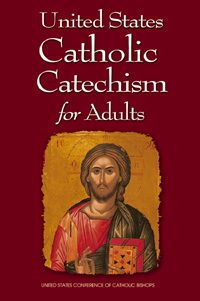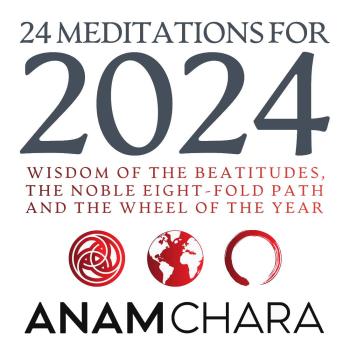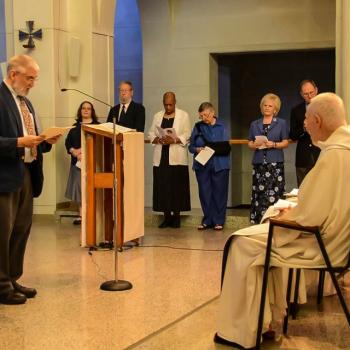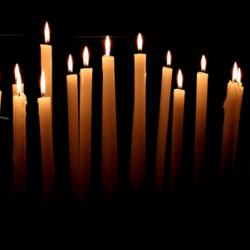
Do you know why Catholics make three small crosses with their thumb — on their forehead, their lips, and their hearts — at every Mass when the Gospel reading is announced?
Here is insight into this practice from the United States Catholic Catechism for Adults:
At Mass when the reading of the Gospel begins, we place the sign of the Cross on our foreheads, lips, and hearts and pray, “May the Lord be in our minds, on our lips, and in our hearts.” Lips, minds, and hearts—these symbolize three kinds of prayer: vocal, meditative, and contemplative. These modes of prayer include formal and informal paths, personal and communal expressions, popular piety, and the liturgical prayer of the Church.[1]
So the action is invocational — calling God in to our minds, our lips, and our hearts. But we invite God into our bodies because we seek intimacy with God — and the heart of such intimacy is prayer. We offer God our hearts, our minds, and our voices because we seek to grow closer to God, in all dimensions of our lives: our thoughts, our words, and our deeds. And the practice by which we seek to respond to God’s love is the practice of prayer.
There are many ways to pray, of course. And the Catechism suggests that of all the many ways we can respond to God, prayer can be usefully understood in three broad ways: vocal prayer (the prayer of our lips), meditation (the prayer of our minds), and contemplation (the prayer of our hearts). Don’t get too carried away with these distinctions — think of Scripture which speaks of “the meditation of my heart” (Psalm 19:14), so we can recognize that all types of prayer can be communicative, meditative, or contemplative. Still, in the broadest and most general sense, when we pray with our lips we are seeking to express ourselves to God (whether we are using our words or the words from a liturgy or a book); when we pray with our minds we seek to grow closer to God through the practice of meditation, and when we pray in the silence of our hearts, we seek to rest in the love of God through contemplation.
Incidentally, the Catechism agrees with me that the heart is a doorway into silence:
Unlike the busy-ness of mental life, the heart is a zone of silence.[2]

What I love about making the three crosses at each Mass is the implicit recognition that everyone is called to all three types of prayer. We are all called to vocal prayer (including liturgical prayer); we are all called to meditation, and we are all called to contemplation. Even if you prefer one form over another, you still have within yourself the capacity (and I would say the obligation) to pray in the other ways as well. Becoming a contemplative does not mean one can stop engaging in vocal or meditative prayer. Finding great joy in the Rosary of the Daily Office does not mean you can ignore the stirrings in your heart for a rich meditative prayer or the even deeper calling of silence.
What I also love about the three crosses is that they remind us that prayer, at least for Christians, is profoundly incarnational. It’s not just a head trip — even if meditation can be cerebral (but it doesn’t have to be). We are all creatures of flesh and blood, and in prayer we do not escape our embodiment — rather we pray with and through our bodies. This is not a cross to bear, but rather a profound joy. I present myself in the fullness of who I am to God. And who am I? An embodied child of God. We pray in our bodies, through our bodies, with our bodies. Our voice, in vocal prayer, emerges from our throats. The thoughts of our meditations flash in the synapses of our grey matter. And the profound stillness of contemplation emerges in the rich silence we discern within and between every beat of our hearts.
So the next time you participate in the Mass, remember to pray “May the Lord be in our minds, on our lips, and in our hearts” as you cross yourself the three times. And bear in mind that this invocation of God is a supplication to a life of prayer — in all its fullness, including meditation and contemplation.
Enjoy reading this blog?
Click here to become a patron.
Notes:
[1] United States Catholic Catechism for Adults, Kindle Locations 6808-6811
[2] ibid., Kindle Location 7093


















